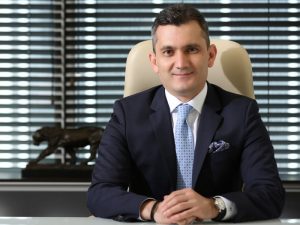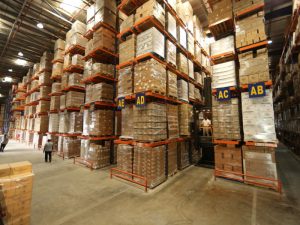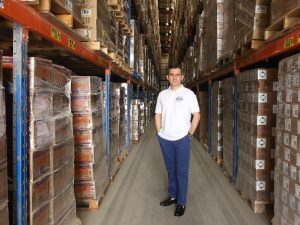With distribution as its primary and strongest suite, Dubai-headquartered Worldwide Distribution Centre (WDC) is eyeing a big surge for his business across the region and beyond

Worldwide Distribution Centre (WDC). based in Jebel Ali Free Zone, Dubai, UAE, is a premier and professional distributor of FMCG (fast moving consumer goods) with a potentially global reach.
The company, founded two decades ago. currently represents such well-known companies as Himalaya Herbals, Unilever, Imperial Dax, Namaste Laboratories, Luster Products, Dr. Miracle’s, Fruit of the Earth, WIPRO-UNZA, Strength of Nature Co., J. Strickland, just to name a few.
Housed in an advanced, sophisticated 20,000 sqft. sprawling warehouse facility in Dubai and empowered with a fleet of modern delivery vehicles, WDC distributes its line of products in the United Arab Emirates, Middle East, North Africa and CIS countries.
WDC’s Founder-CEO Khamid Ismatullaev spoke recently to LogisticsGulf.com on a wide range of issues—his origins, provenance, current ambitions and vision for the future.
LogisticsGulf.com (LG): Worldwide Distribution Centre in Dubai at the turn of the millennium, you have grown the company to one of the largest retail and wholesale distribution companies in the Middle East. Briefly, walk us through the genesis and the growth of the company over the last two decades?
Khamid Ismatullaev (KI): I started my professional life back in 1998 in my homeland Tashkent, Uzbekistan. Since 1999, I have been running organisations with a full P&L responsibility, incorporated and successfully run several profitable companies around the world.
I subsequently identified an opportunity to expand the business in the Middle East, so relocated to Dubai and launched the company in the UAE with a new name to reflect my global vision for the business – Worldwide Distribution Centre.
WDC is now one of the largest FMCG retail and wholesale distribution companies in the Middle East. We specialise in supplying hair and body care, beauty and consumer products, perfumeries, soap and baby care items.
We distribute products for multinationals such as L’Oréal, Henkel, Himalaya and others across the Middle East, Africa, East Asia and CIS. We are also the leading distribution house for multicultural and a range of consumer products in the Middle East and Africa.
LG: What range of capabilities and services do you offer your principals?
KI: Through an established and structured distribution network, WDC provides global companies the opportunity to launch products in new and untapped markets, offering an effective solution to help grow their businesses. In short, we provide the ultimate distribution service for multinational companies.
LG: What do you attribute your success to?
KI: Initially we were in the right place at the right time. There were no professional distribution companies efficiently and reliably supplying to small and medium-sized stores, which we call traditional trade. The hypermarkets and larger pharmacy groups had stable supply chains from other distribution companies.
From day one, I set out to build a company that had a positive and ethical culture at its core. I prioritise providing an efficient yet personal and professional service to manufacturers and multinationals, whilst ensuring my workforce enjoys the working environment of the company.
LG: Are you planning to expand your current product range?
KI: Yes. We are working closely with our principal companies. We also keep them informed of emerging market trends and we help them to launch innovative products.
LG: Describe your distribution model across countries where your principals have official national agents and distributors? How does the mechanism work?
KI: We don’t supply where the principal company has agents and distributors. We provide distribution only in untapped, new markets for the manufacturer. The process starts from receiving the products from the manufacturer through to making sure they get to the retailer to place on their shelves.
LG: Talk to us about the scale and scope of your centralised logistics operations.

KI: It’s very beneficial to us being located in the UAE and especially in Jebel Ali Port because it’s one of the largest distribution hubs in this region. The transport network and infrastructure that has been developed by the local government has helped us to reach our customers and dealers timely and efficiently.
Over the years, we have established a secure and accurate system that helps us deliver the products smoothly and on time. We have an efficient transportation system managed by a trusted shipping company.
While we prepare the documentation in house, the shipping company assists us with booking containers to ensure we are always on time with deliveries. We also own a fleet of trucks in the UAE to facilitate with the local distribution.
LG: Retail is generally perceived in the current scenario to be soft at the present time and fraught with challenges. What are the challenges confronting the retail industry?
KI: The cost of manufacturing and raw materials is increasing so manufactures are facing issues of rising costs. If they increase their prices, the retailers reduce the quantity that they buy. Retailers also face passing on these increasing costs to their customers.
There are now also more manufacturers producing more products, meaning there is more competition. A few years ago, say there may have been five dominant suppliers of shampoo products that you would have found on the supermarket shelves.
Now, these large suppliers have diversified their range offering a wider selection of shampoos, plus there are smaller, niche products available now also available on the shelves. This doesn’t impact the retailer as they have a wider product selection to offer consumers, but it does impact the manufacturer as there is more competition and they have a smaller slice of the pie.
LG: Staying upbeat, what opportunities do you anticipate for WDC going forward?
KI: Over the past ten years we have seen a change in what consumers in the region are looking for from hair and body care products and that provides us with new opportunities. Consumers in the region are very well-educated about the industry (in part due to social media) so the demands here reflect global trends. New innovative products and expanding product ranges allow us to reinforce our position with new products in existing markets as well as expanding into new markets.
Natural ingredients are very popular and in the last year or so, there has been an increasing demand for more eco-friendly and sustainable packaging. We are also finding that customers in the region are demanding more innovative products that contain high-quality ingredients, which are effective, time-saving and affordable. Customers want to have easy access to globally-recognised brands and also smaller, niche manufacturers.
LG: What do you make of the E-commerce sector? What competition is it providing the traditional retailing sector?
KI: It’s a big challenge for traditional retailers. Online shopping offers the consumer the opportunity to save time and money and gives them a wider variety of products to choose from compared to what is available on the retailers’ shelves. Consumers can also educate themselves before they decide to buy a product.
LG: How is it impacting your business?
KI: It’s good for us as we supply to both!
LG: How important is bricks-and-mortar outlets in the light of the current scenario?

KI: There will always be space in the market for small stores and hypermarkets. Small, local stores offer a convenient solution for customers to buy beauty and personal care items on the go, whereas the hypermarkets offer a wide selection usually at lower prices. It’s also worth bearing in mind that in some parts of the Middle East, Africa, East Asia and CIS where we supply to, there are customers who prefer not to shop online or who have limited access to the internet.
LG: How did WDC fare in 2018 / last fiscal year and what is your outlook for the current year?
KI: We had a very strong start to 2019. Our gross revenue figure has increased by 20% between January and April 2019. The increase in revenue over these four months can be attributed to the company’s strategic expansion across Africa and East Asia, capitalising on the fast-growing personal care markets in both regions. These markets are consumer hot spots, fueling the current growth in the beauty and personal care market.
LG: Which countries or regions offer the best promise for future growth?
KI: Globally, it is East and West Africa and India.
LG: Where do you hope to take the company in the short and long-term futures?
KI: Over the next 5-10 years, we will expand WDC into more new markets and ultimately, we want to become the largest FMCG retail and wholesale distribution company globally. We already have offices in the UAE, India and Uzbekistan to ensure that we can efficiently supply across the Middle East, Africa, East Asia and CIS.
LG: Talk to us about the changing dynamics of the retail industry. How significant are the millennials to your business and how are retailers wooing this segment?
KI: The industry is changing with the growth of the E-commerce market. Millennials will look to buy more and more products online and through social media.
There will still be a place in the market for traditional retailers. The small stores, such as the ones in the ground floors of the apartment buildings in Dubai, provide a convenient solution to that building’s residents and the neighbourhood. The hypermarkets will also continue to thrive as they are the major product holders and offer variety and lower prices.
In either scenario, customers are still supporting my business as they are buying the products.
